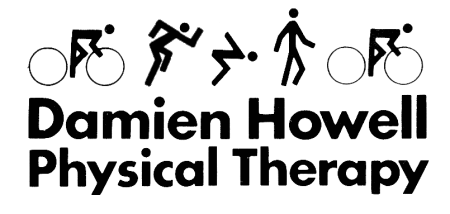Hormone replacement therapy tendon repair post-menopause
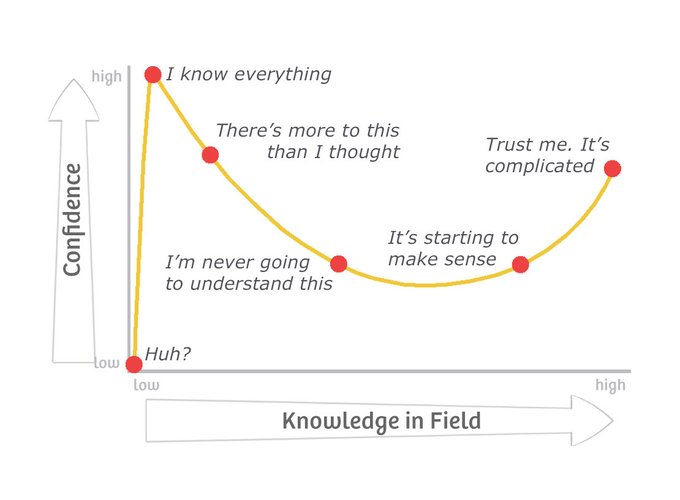
The Dunning-Kruger effect is a cognitive bias in which individuals with limited competence in a particular domain overestimate their abilities. It is when we lack competence that we are most likely to be brimming with overconfidence. The following is a description of how it applies to me.
I know everything
Early in my career as a Physical Therapist in the previous century when I was a new graduate of Physical Therapy school. I was overly confident about my knowledge and skills.
There is more to this than I thought.
Rapidly I became perplexed by some patients. I remember a female patient in her late fifties with tennis elbow. Before we could resolve the tennis elbow, she complained of elbow pain on the non-dominant side. Then she developed plantar fasciitis. I did not understand it, but I was self-confident enough to call it the “wandering itis.” I guessed it had something to do with menopause. I did know menopause results in lower levels of estrogen and was a factor in the development of osteoporosis. I had no clue how it affected tendinitis. I had no clue what to do about it.
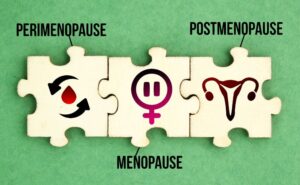
Later in my career during the current century a female in her mid-sixties had posterior tibial tendinopathy and after physical therapy, orthotic therapy, and shoe therapy she developed posterior tibial tendinopathy in the other leg. She was active, but not athletic. She had been on hormone replacement therapy for years. Later I came across her obituary reporting she had died of pulmonary embolism. Blood clots can be a risk of hormone replacement therapy.
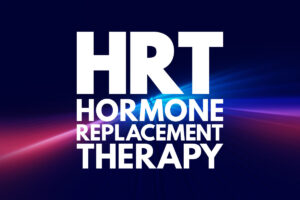
Another young lady in her early seventies, who had undergone surgical procedures for rotator cuff tendinopathy on both shoulders sought my assistance for posterior tibial tendinopathy.
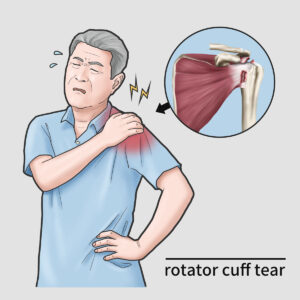
She was active in taking care of her farm and enjoyed skeet shooting. She had been on hormone replacement therapy for years. She later developed breast cancer and liver cancer, which is a risk factor of hormone replacement therapy.
I searched the literature and found in post-menopausal women estrogen levels decline. Collagen production which provides structural support to tendons decreases. A study by T Finni and colleagues in 2009 found that in physically active post-menopausal females using hormone replacement therapy the diameter of the tendons is smaller. 1
Metta Hansen and colleagues in 2009 found physically active post-menopausal females' tendon healing resulted in smaller tendon fibers.2
Based on these two studies, my cognitive bias was that the use of long-term hormone replacement therapy may have adverse effects on tendon healing. Perhaps impairment of tendon healing is a risk factor in the use of hormone replacement therapy in active post-menopausal females.
I am never going to understand this.
However recently, a 70-year-old active female with chronic rotator cuff syndrome, who had been on hormone replacement therapy for years sought my assistance. In addition to standard evidence-based therapy for rotator cuff syndrome, I advised her that she should consult with her gynecologist about discontinuing hormone replacement therapy. She stopped hormone replacement therapy, and immediately experienced an increase in pain in the shoulder joint and other joints.
Wow I knew less than I thought I knew.
I searched the literature again to see if new information was available since the two studies in 2009 and if there was any clarifying information.1,2 I discovered there is very little information. Interestingly while estrogen-like compounds play a significant role in the treatment of a variety of gynecological disorders, breast cancer, and osteoporosis extraordinarily little research has been done on estrogen-like compounds on tendons, particularly when it comes to active post-menopausal females.
In a search of PubMed using keywords estrogen replacement therapy post-menopause and tendon, there are only nine citations. Metta Hansen and colleagues suggest there is evidence that hormone replacement therapy has beneficial effects on tendons during the period of post-menopause.3 Systematic review of the literature there is very limited and contradictory information regarding hormone therapy post-menopause on tendon repair – both positive effects and negative effects.4,5
It is starting to make sense:
Tendinopathy at multiple sites or “wandering itis” during post-menopause consult with a healthcare provider and reflect on the use of hormone replacement therapy.
- Start with evidence-based guidelines for management of post-menopause osteoporosis diet, and regular strengthening training with or without hormone replacement therapy.6
- There is no evidence to identify an optimal dose or type of administration of estrogen-like compounds relative to tendon biology.5
- Recognize estrogen levels are just one of many potential contributing factors to tendinopathy during post-menopause including mechanical overuse (repetitive use, muscle imbalance; deviant movements); intrinsic factors (age, body weight, hormonal background, prior MSK injury); extrinsic factors (alcohol, nutrition, equipment, Pharmacological agents).7
- Use anaerobic exercise (higher intensity exercise) to improve natural levels of estrogen.8
- Use strengthening exercise to improve bone density and hormonal metabolic levels.9
Trust me it is complicated:
The effect of hormone replacement therapy during post-menopause on tendons is complex and confusing. Female hormones may have beneficial and non-beneficial effects at the same time, making it difficult to find a straight answer. Beliefs of the effect of female hormones on tendons is frequently based on unsupported biases, highlighting the need for high-quality research.10
References:
- Finni T, Kovanen V, Ronkainen PH, et al. Combination of hormone replacement therapy and high physical activity is associated with differences in Achilles tendon size in monozygotic female twin pairs. J Appl Physiol (1985). 2009;106(4):1332-1337.
- Hansen M, Kongsgaard M, Holm L, et al. Effect of estrogen on tendon collagen synthesis, tendon structural characteristics, and biomechanical properties in postmenopausal women. J Appl Physiol (1985). 2009;106(4):1385-1393.
- Hansen M. Female hormones: do they influence muscle and tendon protein metabolism? Proc Nutr Soc. 2018;77(1):32-41.
- Ganderton C, Semciw A, Cook J, Pizzari T. The effect of female sex hormone supplementation on tendon in pre and postmenopausal women: A systematic review. J Musculoskelet Neuronal Interact. 2016;16(2):92-104.
- Leblanc DR, Schneider M, Angele P, Vollmer G, Docheva D. The effect of estrogen on tendon and ligament metabolism and function. J Steroid Biochem Mol Biol. 2017;172:106-116.
- Camacho PM, Petak SM, Binkley N, et al. American Association of Clinical Endocrinologists/American College of Endocrinology Clinical Practice Guidelines for the Diagnosis and Treatment of Postmenopausal Osteoporosis- 2020 Update Executive Summary. Endocr Pract. 2020;26(5):564-570.
- Steinmann S, Pfeifer CG, Brochhausen C, Docheva D. Spectrum of Tendon Pathologies: Triggers, Trails and End-State. Int J Mol Sci. 2020;21(3).
- Razzak ZA, Khan AA, Farooqui SI. Effect of aerobic and anaerobic exercise on estrogen level, fat mass, and muscle mass among postmenopausal osteoporotic females. Int J Health Sci (Qassim). 2019;13(4):10-16.
- Capel-Alcaraz AM, Garcia-Lopez H, Castro-Sanchez AM, Fernandez-Sanchez M, Lara-Palomo IC. The Efficacy of Strength Exercises for Reducing the Symptoms of Menopause: A Systematic Review. J Clin Med. 2023;12(2).
- Legerlotz K, Hansen M. Editorial: Female Hormones: Effect on Musculoskeletal Adaptation and Injury Risk. Front Physiol. 2020;11:628.
The information on this website is not intended or implied to be a substitute for professional medical advice, diagnosis, or treatment. You are encouraged to perform additional research regarding any information contained available through this website with other sources and consult with your physician.
Damien Howell Physical Therapy – 804-647-9499 – Fax: 866-879-8591 At-Home, At Office, At Fitness Facility – I come to you, I do home visits Damien@damienhowellpt.com
